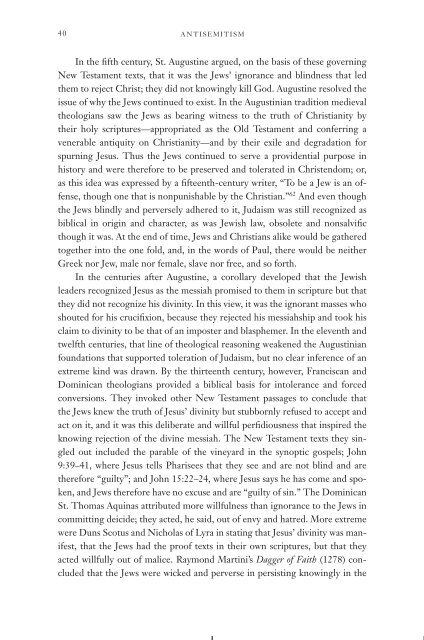41845358-Antisemitism
41845358-Antisemitism
41845358-Antisemitism
You also want an ePaper? Increase the reach of your titles
YUMPU automatically turns print PDFs into web optimized ePapers that Google loves.
40 ANTISEMITISM<br />
In the fifth century, St. Augustine argued, on the basis of these governing<br />
New Testament texts, that it was the Jews’ ignorance and blindness that led<br />
them to reject Christ; they did not knowingly kill God. Augustine resolved the<br />
issue of why the Jews continued to exist. In the Augustinian tradition medieval<br />
theologians saw the Jews as bearing witness to the truth of Christianity by<br />
their holy scriptures—appropriated as the Old Testament and conferring a<br />
venerable antiquity on Christianity—and by their exile and degradation for<br />
spurning Jesus. Thus the Jews continued to serve a providential purpose in<br />
history and were therefore to be preserved and tolerated in Christendom; or,<br />
as this idea was expressed by a fifteenth-century writer, “To be a Jew is an offense,<br />
though one that is nonpunishable by the Christian.” 62 And even though<br />
the Jews blindly and perversely adhered to it, Judaism was still recognized as<br />
biblical in origin and character, as was Jewish law, obsolete and nonsalvific<br />
though it was. At the end of time, Jews and Christians alike would be gathered<br />
together into the one fold, and, in the words of Paul, there would be neither<br />
Greek nor Jew, male nor female, slave nor free, and so forth.<br />
In the centuries after Augustine, a corollary developed that the Jewish<br />
leaders recognized Jesus as the messiah promised to them in scripture but that<br />
they did not recognize his divinity. In this view, it was the ignorant masses who<br />
shouted for his crucifixion, because they rejected his messiahship and took his<br />
claim to divinity to be that of an imposter and blasphemer. In the eleventh and<br />
twelfth centuries, that line of theological reasoning weakened the Augustinian<br />
foundations that supported toleration of Judaism, but no clear inference of an<br />
extreme kind was drawn. By the thirteenth century, however, Franciscan and<br />
Dominican theologians provided a biblical basis for intolerance and forced<br />
conversions. They invoked other New Testament passages to conclude that<br />
the Jews knew the truth of Jesus’ divinity but stubbornly refused to accept and<br />
act on it, and it was this deliberate and willful perfidiousness that inspired the<br />
knowing rejection of the divine messiah. The New Testament texts they singled<br />
out included the parable of the vineyard in the synoptic gospels; John<br />
9:39–41, where Jesus tells Pharisees that they see and are not blind and are<br />
therefore “guilty”; and John 15:22–24, where Jesus says he has come and spoken,<br />
and Jews therefore have no excuse and are “guilty of sin.” The Dominican<br />
St. Thomas Aquinas attributed more willfulness than ignorance to the Jews in<br />
committing deicide; they acted, he said, out of envy and hatred. More extreme<br />
were Duns Scotus and Nicholas of Lyra in stating that Jesus’ divinity was manifest,<br />
that the Jews had the proof texts in their own scriptures, but that they<br />
acted willfully out of malice. Raymond Martini’s Dagger of Faith (1278) concluded<br />
that the Jews were wicked and perverse in persisting knowingly in the


